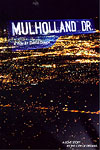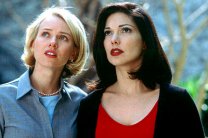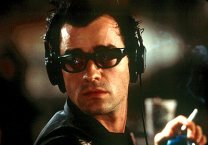|
Mulholland Drive
When life hands you lemons, make chocolate milk with a hint of tabasco...
Over a decade ago, David Lynch blew the minds of ABC viewers with a surreal little something called Twin Peaks. Though it eventually sputtered out, it had what network people call "watercooler" value, meaning people talked about each episode the next day.
ABC thought that just maybe lightning could strike twice, so they offered to let Lynch create another pilot for a series. He gave them Mulholland Drive. The network passed, but European backers gave Lynch extra cash to turn the pilot into a feature film. The director took to hear the old adage: When life hands you lemons, make chocolate milk with a hint of tabasco.
Some people try to interpret their dreams. Lynch doesn't bother. Instead, he films them. If the dream doesn't make sense to you, that's okay, because he claims it makes perfect sense to him.
He will tell the occasional straight story (as in his last film, The Straight Story), but even then a little of the ethereal sneaks through. In Mulholland Drive, the first half plays out almost like a standard Hollywood mystery before veering straight into left field. Call it dream noir, a genre best left to Lynch, and one he has not explored fully in a while.
It opens with a woman (Laura Elena Harring) being held at gunpoint in a limousine. Her first spoken line indicates dream territory: "We don't stop here." She may have played this scene out before, and it's not going the way it usually does.
Joyriding teens careen in a convertible down the actual Mulholland, interrupting the scene by wiping out. Everyone dies except for the woman, who wanders off with no clue as to who she is. (Later she will take the name "Rita" for herself, after a poster of Gilda.) Certainly that mystery was meant to be played out over a season, and the solution really has no bearing in the finished film. If you like your endings neat, look elsewhere.
Her story juxtaposes against that of bright-eyed blonde Betty (Naomi Watts), who dreams of Hollywood stardom. Straight out of an old movie musical, it looks like Betty will get her wish, catching the eye of a hot young director (Justin Theroux). But before things can go swimmingly, a young man confronts his literal dream of a homeless man controlling all the events around us. Is the homeless man God or the Devil? Or does it matter?
Probably not. Once we get past the part suitable for television, all bets are off. Even the linear scenes change course at the drop of a hat, hinting at darker mysteries. No doubt this proved too surreal for the Mouse Factory. ABC considered it "too dark and creepy," but we get left wondering where a full-fledged series might have gone. Some actors probably wonder, too; the great Robert Forster (Jackie Brown) gets wasted as a detective in an early scene, clearly meant to come back later. He never does.
Lynch does bring back many of his familiar obsessions. The dancing dwarf from Twin Peaks, Michael J. Anderson, may even be playing the same character; certainly his setting looks familiar. His role here makes less sense, becoming one of those moments that cannot be thought about too much. The idea of lost innocence weaves in and out, along with snatches of Roy Orbison tunes (an a capella Spanish version of Crying stands as one of the most haunting moments in film this year). And of course there are moments that just don't add up, no matter what kind of math you use. Frustrating, or should you just let it go?
Reason barely has a place in a Lynch film. Mulholland Drive washes over the audience, especially in the last hour. Lynch's visuals linger in the mind, even when accomplished simply. Few directors have managed to use Los Angeles in its guise as La La Land so well. It may all be smoke and mirrors (literally at many points), but we happily embrace the illusion.
The sound also stands out. Lynch gets amazing support from stalwart composer Angelo Badalamenti (also appearing as a mysterious money man). His score evokes both longing and dread with equal effectiveness. And just when things get too oppressive, a fifties pop song plays, lulling the viewer into a false sense of security. Don't worry; it quickly disappears with the dull roar of blood rushing through your ears. Country star Billy Ray Cyrus even cameos, but does not actually perform. See? Lynch isn't interested in nightmares.
It takes a special kind of actor to hold their own in a David Lynch film, and he has lucked into some great ones. Both the female leads, Watts and Haring, play their respective archetypes perfectly. (And then some, but that would be giving the last hour away). Theroux wanders through the movie in a daze, but it seems intentional. A few minor characters give haunting performances, most notably Monty Markham as "The Cowboy."
In a very commercial (read: desperate) year for film, Lynch once again delivers what film can be at its best: art. It's not for everyone, and it's possible that the more you understand it, the more screwed up you are. But that's okay; we've got plenty of room for folks like you.
What's It Worth? $8
Copyrights and trademarks for existing
entertainment (film, TV, comics, wrestling) properties are held by their
respective owners and are used with permission or for promotional purposes
of said properties. All other content ™ and © 2001 by FanboyPlanet.
If you want to quote us, let us know. We're media whores.
















